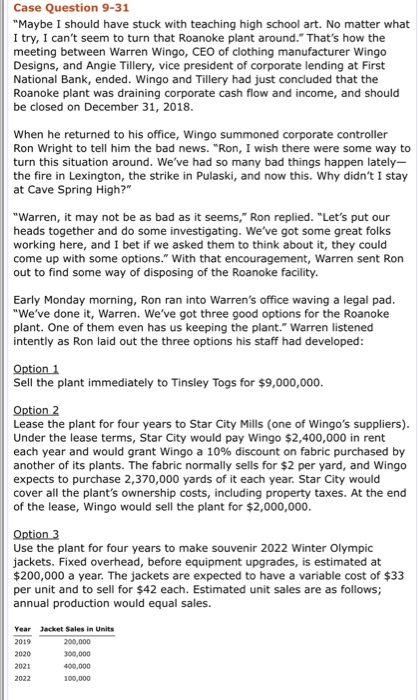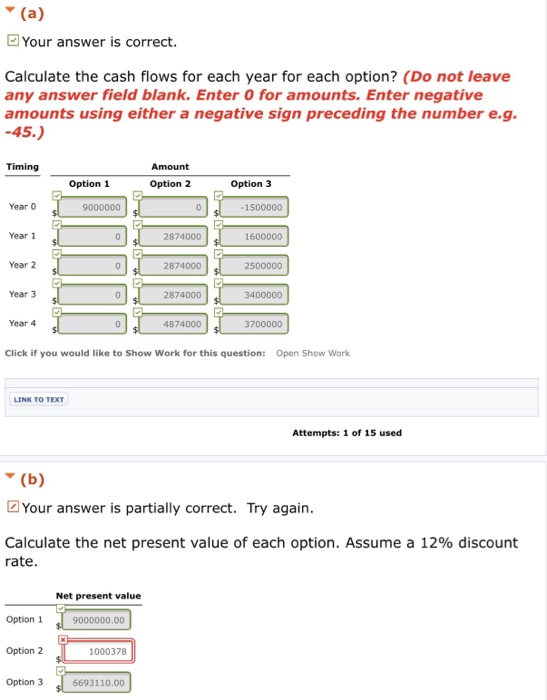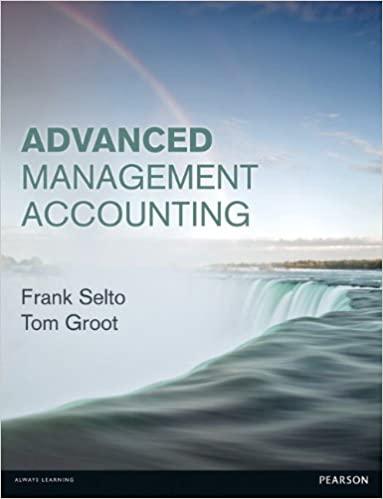Case Question 9-31 "Maybe I should have stuck with teaching high school art. No matter what I try, I can't seem to turn that Roanoke plant around. That's how the meeting between Warren Wingo, CEO of clothing manufacturer Wingo Designs, and Angie Tillery, vice president of corporate lending at First National Bank, ended. Wingo and Tillery had just concluded that the Roanoke plant was draining corporate cash flow and income, and should be closed on December 31, 2018 When he returned to his office, Wingo summoned corporate controller Ron Wright to tell him the bad news. "Ron, I wish there were some way to turn this situation around. We've had so many bad things happen lately- the fire in Lexington, the strike in Pulaski, and now this. Why didn't I stay at Cave Spring High?" "Warren, it may not be as bad as it seems," Ron replied. "Let's put our heads together and do some investigating. We've got some great folks working here, and I bet if we asked them to think about it, they could come up with some options." With that encouragement, Warren sent Ron out to find some way of disposing of the Roanoke facility. Early Monday morning, Ron ran into Warren's office waving a legal pad. "We've done it, Warren. We've got three good options for the Roanoke plant. One of them even has us keeping the plant. Warren listened intently as Ron laid out the three options his staff had developed Option 1 Sell the plant immediately to Tinsley Togs for $9,000,000. Option 2 Lease the plant for four years to Star City Mills (one of Wingo's suppliers) Under the lease terms, Star City would pay Wingo $2,400,000 in rent each year and would grant Wingo a 10% discount on fabric purchased by another of its plants. The fabric normally sells for $2 per yard, and Wingo expects to purchase 2,370,000 yards of it each year. Star City would cover all the plant's ownership costs, including property taxes. At the end of the lease, Wingo would sell the plant for $2,000,000 Option 3 Use the plant for four years to make souvenir 2022 Winter Olympic jackets. Fixed overhead, before equipment upgrades, is estimated at $200,000 a year. The jackets are expected to have a variable cost of $33 per unit and to sell for $42 each. Estimated unit sales are as follows; annual production would equal sales. 2019 2020 2021 200,000 300,000 400,000 100,000 Your answer is correct Calculate the cash flows for each year for each option? (Do not leave any answer field blank. Enter 0 for amounts. Enter negative amounts using either a negative sign preceding the number e.g. -45.) Timingoption Amount Option 2 Option 3 Year 0 9000000 1500000 Year 1 2874000 1600000 Year 2 2874000 2500000 Year 3 2874000 3400000 Year 4 4874000 3700000 Click if you would like to Show Work for this question: Open Show Work Attempts: 1 of 15 used Your answer is partially correct. Try again. Calculate the net present value of each option. Assume a 12% discount rate Net present value Option 1 9000000.00 Option 2 1000378 Option 3 6693110.00








